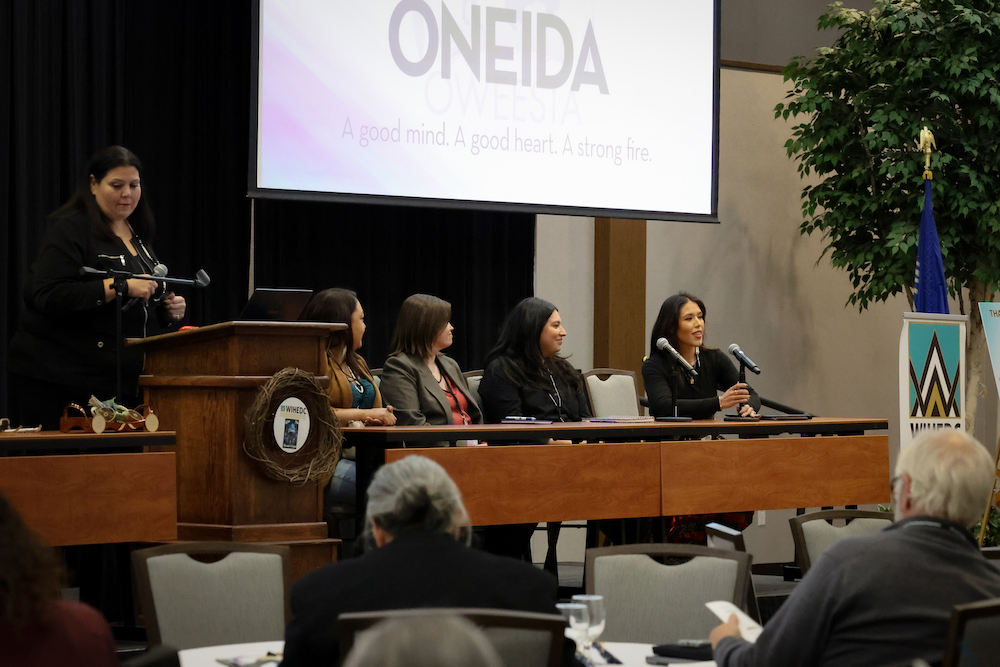
- Details
- By Brian Edwards
- Economic Development
LAC DU FLAMBEAU, Wisc. — The Wisconsin Indigenous Housing & Economic Development Corp. (WIHEDC) is partnering with Wisconsin tribes to establish small business hubs on their reservations through a state grant, with each of the state's 11 federally recognized tribes eligible to receive $90,000.
The nonprofit has signed memorandums of agreement with six tribes so far and is working to finalize partnerships with the state's remaining five tribes by year's end, according to Fern Orie, WIHEDC's chief executive officer who leads the hub initiative.
The grant funding comes from the Wisconsin Department of Administration's Diverse Business Assistance program.
Economic development representatives from the Forest County Potawatomi, St. Croix Band of Lake Superior Chippewa, Bad River Band of Lake Superior Chippewa, Menominee Nation, Red Cliff Band of Lake Superior Chippewa and Oneida Nation discussed their hub plans during a panel Wednesday at a two-day housing and economic development conference presented by WIHEDC at the Lake of Torches Resort Casino in Lac du Flambeau, Wis.
“We have a generous grant from DOA to build a native small business hub on every reservation, whether that's a physical location, whether it's somebody staffing that type of work or working with the tribe in whatever landscape they have in entrepreneurial activities right now,” Orie said during the panel.
The hubs will take different forms based on each tribe's existing infrastructure and needs. At the Forest County Potawatomi, the hub will include a culturally grounded entrepreneurial training program open to members of any Wisconsin tribe, according to Alexis Harris, director of the Innovation Center at Potawatomi Ventures.
The Menominee Nation has created two free incubator offices in a new office building where entrepreneurs can work on business plans, meet with clients, and access printing, Wi-Fi and conference spaces for two-week periods, said Crystal Chevalier, CEO of Menominee Indian Tribe’s Wolf River Development Company.
Bad River has focused on policy infrastructure, passing a business operations code this summer that provides multiple options for tribal members to organize businesses under tribal law. The tribe also manages a $2 million commercial loan fund through the State Small Business Credit Initiative, according to Philomena Kebec, Bad River's economic development coordinator.
The Oneida Nation plans to transform its Community Education Center into a Community Resource Center that will offer business planning assistance, digital literacy training, financial education, workspace and mentorship connections. The tribe recently received approval for 477 employment funding, which will provide additional resources for the hub, said Sean Powless, manager of the center.
WIHEDC aims to establish hubs with all 11 federally recognized tribes in Wisconsin and create an online resource directory connecting the tribal entrepreneurship ecosystem. The organization has requested an extension from DOA to provide more time to finalize agreements with the remaining tribes.
The initiative addresses capacity challenges tribal entrepreneurs face by providing dedicated space, staff support and connections to existing resources. St. Croix Tribal Economic Development Corporation, which already offers entrepreneurship grants up to $5,000 for tribal members, plans to use hub funding to expand business support tools, said Executive Director Carly Eichman.
Red Cliff has been developing a small business entrepreneur resource group and hired a tribal member as an economic development trainee. That person now operates Ike's Place, a coffee business with a travel trailer, and will be serving conference attendees this weekend, according to Rob Czypinski, the tribe's economic community development planner.
During the panel discussion, participants addressed questions about maintaining separation between business operations and tribal government. Kebec said structural separation is fundamental to successful economic development.
“The tribal government cannot run businesses and run government and do both things well at the same time,” Kebec said. “So that separation is absolutely critical, and having codes and laws that create those separations is part of the foundation of the expansion.”
The participating tribes have structured their hub programs under different governance models. Some use tribal business entities to manage the funding while others work through planning departments with detailed budgets and regular council communication.
“The time is now, if we don't unite as people, as Indigenous people, we're going to miss the mark,” Orie said.
